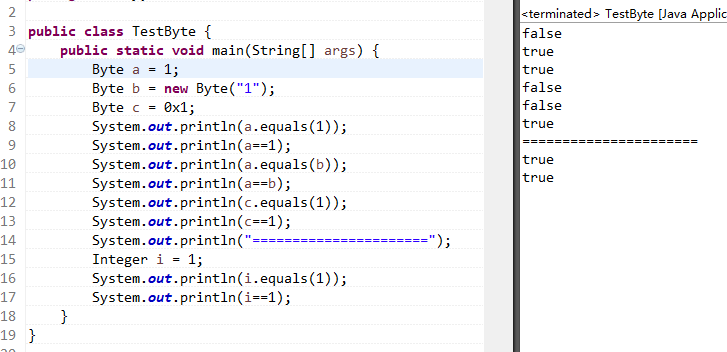/**
* Compares this object to the specified object. The result is
* {@code true} if and only if the argument is not
* {@code null} and is an {@code Integer} object that
* contains the same {@code int} value as this object.
*
* @param obj the object to compare with.
* @return {@code true} if the objects are the same;
* {@code false} otherwise.
*/
public boolean equals(Object obj) {
if (obj instanceof Integer) {
return value == ((Integer)obj).intValue();
}
return false;
}
* Returns an {@code Integer} instance representing the specified
* {@code int} value. If a new {@code Integer} instance is not
* required, this method should generally be used in preference to
* the constructor {@link #Integer(int)}, as this method is likely
* to yield significantly better space and time performance by
* caching frequently requested values.
*
* This method will always cache values in the range -128 to 127,
* inclusive, and may cache other values outside of this range.
*
* @param i an {@code int} value.
* @return an {@code Integer} instance representing {@code i}.
* @since 1.5
*/
public static Integer valueOf(int i) {
if (i >= IntegerCache.low && i <= IntegerCache.high)
return IntegerCache.cache[i + (-IntegerCache.low)];
return new Integer(i);
}
/**
* Compares this object to the specified object. The result is
* {@code true} if and only if the argument is not
* {@code null} and is a {@code Byte} object that
* contains the same {@code byte} value as this object.
*
* @param obj the object to compare with
* @return {@code true} if the objects are the same;
* {@code false} otherwise.
*/
public boolean equals(Object obj) {
if (obj instanceof Byte) {
return value == ((Byte)obj).byteValue();
}
return false;
}
Integer的equals方法是转为int类型 ,Byte的equals是byte类型 ,1是int类型

